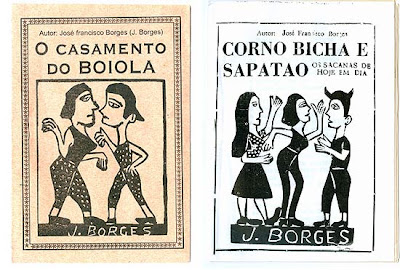If you come to visit us in Brazil, you’ll occasionally see a stand where the offerings look like this:
Literatura de Cordel (lit. “cord literature”) derives its name from the way the wares are often displayed, i.e. hung by a cord, usually with the aid of clothespins.
Such stands are less common in the southern part of the country, but are a feature in many of the fairs and markets of the northeast, principally in the States of Pernambuco, Paraiba and Ceará.
These little booklets are the last survivors of a form of popular literature with which an inhabitant of eighteenth-century Madrid, or nineteenth-century England, would have been quite familiar, but that you’d be hard-put to find elsewhere in the modern world. They contain stories and ballads and are generally produced in black-and-white, illustrated with woodcuts.
Down through the years, the content has taken-on a distinctly Brazilian flavor.
Many of the books deal with the folklore, legends and history of the northeast, subjects like Lampião and his band.
I've previously written about him under the title The Bandit King. And, if you like, you can read that post by going here:
One of the classics of cord literature, The Arrival of Lampião in Hell, by José Pacheco, is much-prized by collectors.
And a satire on the Brazil’s former president, The Arrival of Lula in Hell has enjoyed a good deal of success.
As to the art, two of the more talented woodcutters are Adir Botelho and José Francisco Borges.
This is Botelho:
And this is a work from Borges, who has had expositions at both the Louvre and the Smithsonian:










2 comments:
These are charming little booklets, Leighton. Thanks for sharing them. I hope we'll have more folklore, customs, and history from you!
Chapbooks--much older than 19th C England, though the word chapbook appears to be early 19th.
Chapmen were itinerant peddlars.
OED 1593 H. Chettle Kind-harts Dreame sig. C2v, Chapmen, able to spred more pamphlets..then all the Bookesellers in London.
Post a Comment